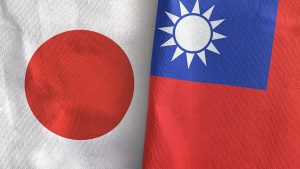Japan-Taiwan relations took a big step forward on Friday, with virtual talks between their ruling parties. Both sides emphasized the convergence between their governments on the perceived threat from China – and reaffirmed their desire to increase cooperation to counter that threat.
The discussions, which lasted roughly 90 minutes, were billed as the party-to-party equivalent of “2+2” meetings, which involve the foreign and defense ministers of two countries. As Japan and Taiwan don’t have formal diplomatic ties, a meeting at the government-to-government level is not feasible. Instead, the talks on August 27 brought together foreign affairs and defense officials from Taiwan’s ruling Democratic Progressive Party (DPP) and Japan’s ruling Liberal Democratic Party (LDP).
A DPP spokesperson, Hsieh Pei-fen, had previously said that the DPP has been promoting party-to-party diplomacy, which is one of the avenues available for Taiwan to interact with foreign counterparts in lieu of formal diplomatic relations.
In the virtual talks on Friday, Taiwan’s DPP was represented by Lo Chih-cheng and Tsai Shih-ying. Lo is the head of the DPP’s international affairs division, and he and Tsai are both members of the Foreign Affairs and National Defense Committee in Taiwan’s legislature. The Japanese side consisted of LDP lawmakers Sato Masahisa and Otsuka Taku, the heads of the LDP’s Foreign Affairs Division and National Defense Division, respectively.
While both parties control their respective governments, there’s a case to be made that the LDP is the Japanese government for all intents and purposes – the party has ruled Japan for 62 out of 66 years since its founding in 1955. That gives special resonance to these party-to-party exchanges. According to the DPP, the LDP “took the initiative” to arrange the talks.
“There has long been solid friendship between Taiwan and Japan, and the cooperation between the two countries in various fields is getting closer,” the DPP said in a Facebook post after the talks. “Through this exchange, we look forward to more in-depth interaction and cooperation on diplomatic and security issues of importance to both sides.”
The Japanese and Taiwanese lawmakers emphasized their common concerns, especially vis-à-vis China.
“During the talks, our two sides expressed our grave concerns about the activities of Chinese warplanes and warships in waters southwest of Japan and the area southeast of Taiwan … and the growing military challenge from China,” Tsai said.
“China’s unilateral change of the regional status quo not only affects the security of the Taiwan Strait, but also affects the security of Japan,” Sato said, per the DPP summary. “Therefore, Japan believes that it should strengthen exchanges with Taiwan.”
According to Otsuka, “Taiwan and Japan are also located near the East China Sea and are a community of shared destiny” – a play on China’s favorite foreign policy mantra. “Recently, China’s military power has increased significantly, and the regional situation cannot be ignored.”
“In the face of regional challenges, Taiwan and Japan have common interests and values, as well as a common vision,” Lo said.
In terms of concrete takeaways, Tsai said the two sides had discussed deeper military cooperation, in particular between Taiwan and Japan’s coast guards, as well as trilateral cooperation with the United States. The lawmakers also discussed supply chain issues, including semiconductors, an industry where Taiwan occupies a key role.
Predictably, the talks were lambasted by China, which claims Taiwan as part of its territory. Beijing is opposed to any interactions between Taiwan and other countries on principle, even aside from the fact that Friday’s exchange was undeniably aimed at counteracting China’s behavior.
“Taiwan is an inalienable part of China’s territory. China firmly opposes all forms of official interactions between Taiwan and countries having diplomatic ties with China,” Foreign Ministry spokesperson Zhao Lijian told reporters. “The Chinese side has lodged solemn representation to the Japanese side.”
Interestingly, China itself has a long history of party-to-party contacts with the Kuomintang (KMT), which originated on the Chinese mainland. Beijing has long seen these party-to-party interactions as a way to keep in touch with counterparts in Taiwan, while sidestepping any formal recognition of the Republic of China government on Taiwan. The Chinese Communist Party, however, has disdained contacts with the DPP, which it sees a “separatist force seeking Taiwan independence.”
The typically bombastic Global Times put its objections to the DPP-LDP talks in more colorful terms, writing that the DPP’s outreach to Japan was tantamount to “cutting its own throat.”
“The DPP has used too much ‘spiritual opium’ on itself and has the illusion that the US and Japan will support it firmly,” the online article said.
Undeterred by China’s reaction, both the DPP and LDP signaled that Friday’s talks will not be the last. “This exchange is the first time between the two parties,” Sato said. “We look forward to continued exchanges and strengthen cooperation between the two parties.”
Tsai added, “I look forward to this dialogue mechanism becoming routine.”

































